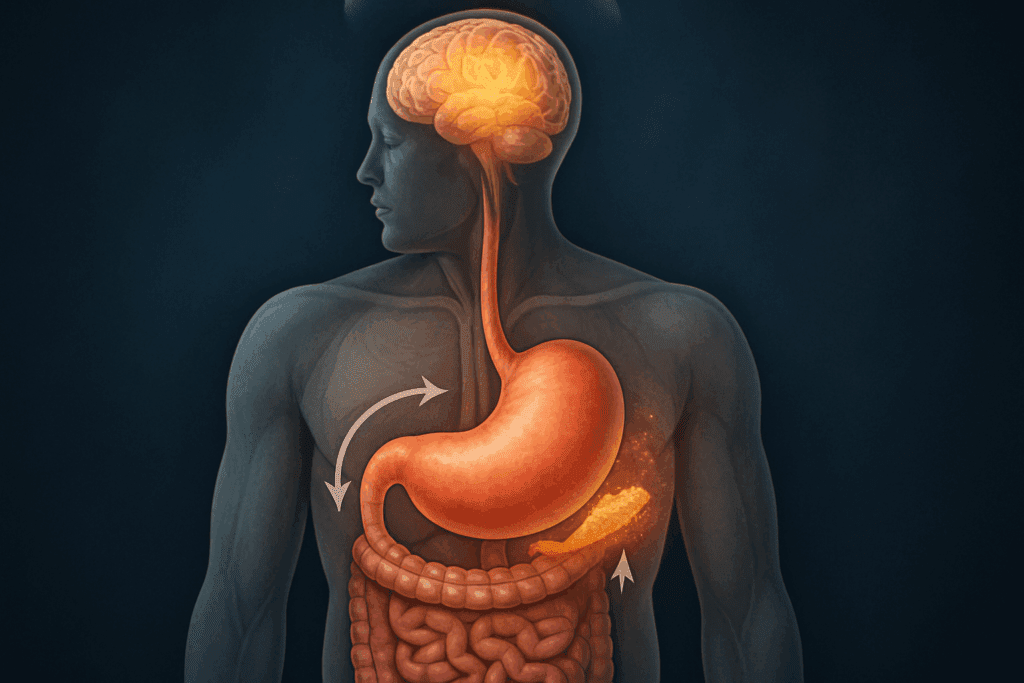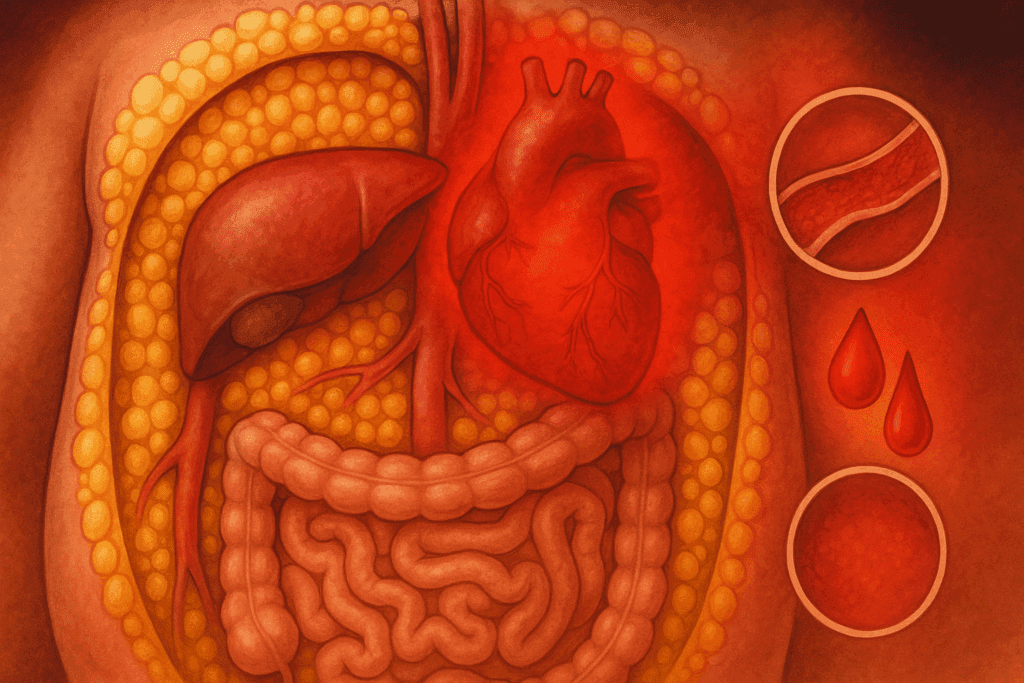In today’s fast-paced, food-abundant society, the ease of overindulging at meals has become an increasingly prevalent concern. With larger portion sizes, all-you-can-eat options, and ever-present snacks, it’s no surprise that many people regularly consume more calories than their bodies require. But what happens if you eat too much—not just occasionally, but consistently? Understanding why overeating is bad is essential not only for maintaining a healthy weight but also for safeguarding overall well-being and proper physical development. While many associate the consequences of overeating solely with weight gain, the reality is that its effects are far more complex and far-reaching. For those wondering whether overeating causes long-term harm or questioning whether your stomach will expand if you over eat constantly, this article will explore the science and offer clarity. We will also address critical questions, including “is overeating bad for growth?” and even, in extreme cases, “can you die from eating too much?” By weaving together nutritional science, digestive physiology, and clinical insights, we aim to offer a well-rounded and evidence-based exploration of this widespread issue.
You may also like: How to Stop Emotional Eating and Regain Control: Mindful Nutrition Strategies That Support a Healthier Lifestyle

Understanding the Physiology of Overeating
To grasp why overeating is bad, it helps to first understand the biological systems at play. The human digestive tract is designed to process a certain volume of food at a time. When we consume more than what our stomach can comfortably accommodate, it stretches to adapt. This stretching is temporary in isolated incidents, but if you consistently overeat, your stomach can expand over time. This change can disrupt hunger and satiety signals, making it more difficult to recognize when you’re full, thereby perpetuating a cycle of excessive consumption. So when people ask, “will your stomach expand if you over eat constantly?” the answer is yes—and this can negatively affect appetite regulation and long-term health behaviors.
Digestive hormones also play a significant role. Hormones such as ghrelin (which stimulates hunger) and leptin (which signals satiety) are tightly regulated by food intake. Chronic overeating can desensitize your body’s response to leptin, leading to what is known as leptin resistance. This state can make you feel perpetually hungry even when you have consumed enough food. Moreover, overeating triggers elevated insulin production as the body attempts to manage the flood of glucose entering the bloodstream. Over time, this can lead to insulin resistance and set the stage for type 2 diabetes. These biochemical imbalances highlight how overeating causes not just weight gain but deeper physiological dysfunctions that can undermine your health.

The Long-Term Impact on Metabolic Health
While short-term overeating may only result in discomfort or indigestion, chronic overconsumption leads to more serious complications. One of the most common outcomes is metabolic syndrome, a cluster of conditions including high blood pressure, elevated blood sugar, excess body fat around the waist, and abnormal cholesterol levels. This condition significantly increases the risk of heart disease, stroke, and type 2 diabetes. It is a stark illustration of why overeating is bad for your metabolic health.
As the body continues to receive more calories than it needs, fat begins to accumulate—not just under the skin but also around internal organs, a condition known as visceral fat. This type of fat is particularly dangerous because it interferes with liver function and increases inflammation throughout the body. Over time, chronic inflammation can damage tissues and impair immune function, increasing susceptibility to disease. Therefore, overeating causes not just superficial changes to your physique, but profound internal health disturbances that can reduce life expectancy and quality of life.
Additionally, sustained overeating can overwhelm the pancreas, the organ responsible for insulin production. As insulin resistance develops, the body may eventually struggle to maintain healthy blood sugar levels, leading to prediabetes or full-blown type 2 diabetes. These metabolic consequences further emphasize that the effects of chronic overeating go far beyond a simple increase in body weight.

Hormonal Disruption and Growth Concerns
A frequently overlooked aspect of overeating is its potential impact on hormonal regulation, particularly in adolescents and young adults who are still undergoing physical development. One might ask, “is overeating bad for growth?” The answer depends on the context, but in general, excessive calorie intake does not translate into better growth outcomes. In fact, it can lead to hormonal imbalances that disrupt growth hormone levels and delay or hasten the onset of puberty in ways that are not physiologically ideal.
In children and teens, the balance of hormones like insulin, growth hormone, and sex hormones is crucial for proper development. Chronic overeating, especially diets high in sugar and saturated fats, can disrupt this balance and promote early maturation, which may shorten the growth window. On the flip side, excessive fat gain can also reduce growth hormone secretion, limiting potential height and muscular development. Thus, rather than enhancing development, overeating can hinder optimal growth outcomes.
Moreover, psychological stress from body image issues and metabolic changes can negatively affect mental and emotional development during formative years. The stigma associated with obesity or being overweight in youth can lead to self-esteem issues and even eating disorders, further complicating the picture. So while calories are indeed needed for growth, more is not always better, and that distinction is crucial for parents, caregivers, and adolescents to understand.
Digestive System Overload and Nutrient Absorption
Another significant concern is the strain that overeating places on the digestive system. Consuming large volumes of food in one sitting forces the stomach, intestines, liver, pancreas, and gallbladder to work overtime. This not only leads to immediate discomfort such as bloating, heartburn, and nausea but can also compromise the efficiency of nutrient absorption. The digestive system is most effective when it is not overburdened. When overwhelmed, food may pass too quickly through the intestines, or conversely, sit in the stomach for too long, both of which impair proper digestion.
People often wonder what happens if you eat too much at a single meal. Beyond discomfort, there is the issue of delayed gastric emptying, which can result in nausea and vomiting. Over time, repetitive episodes of overeating can increase the risk of gastritis, peptic ulcers, and even gastroesophageal reflux disease (GERD). The body is not designed to handle constant excess, and pushing its limits meal after meal eventually takes a toll.
Additionally, excessive intake of processed and high-fat foods can alter the gut microbiome, which plays a central role in digestion, immune function, and even mental health. An imbalanced microbiome contributes to poor nutrient assimilation and increased intestinal inflammation. This shows how overeating causes a ripple effect, leading to multiple dysfunctions throughout the digestive tract and beyond.

Can You Die from Eating Too Much? The Risk of Acute and Chronic Complications
Though it may sound extreme, one valid question people occasionally ask is, “can you die from eating too much?” While death from a single episode of overeating is rare, it is not impossible. In extreme cases, consuming an extraordinarily large quantity of food in a short amount of time can lead to gastric rupture, a condition where the stomach literally tears due to overexpansion. This is a medical emergency that can result in internal bleeding, shock, and death if not treated promptly.
More commonly, the danger lies in the cumulative effects of overeating over time. Chronic overconsumption significantly raises the risk of heart disease, stroke, liver failure, kidney disease, and various forms of cancer. These are not hypothetical risks but well-documented outcomes supported by decades of medical research. Additionally, conditions like sleep apnea, osteoarthritis, and gallbladder disease are all strongly linked to habitual overeating.
There is also the psychological burden to consider. Food addiction and compulsive eating disorders can trap individuals in a cycle of guilt, isolation, and worsening health, sometimes leading to suicidal ideation or depression. Thus, while overeating may not kill you instantly, its long-term consequences can be life-threatening. Understanding why overeating is bad is not just about physical discomfort or weight gain; it’s about recognizing the very real risks to longevity and quality of life.

The Link Between Chronic Overeating and Mental Health
Mental health often both contributes to and suffers from overeating. Emotional eating is a common response to stress, anxiety, and depression. Food, particularly high-sugar and high-fat options, can trigger the brain’s reward pathways, temporarily alleviating emotional pain. However, this short-lived comfort can quickly turn into a harmful pattern. The guilt and physical discomfort that follow a binge can deepen existing emotional struggles, creating a self-perpetuating cycle.
From a neurological perspective, repeated overeating alters the brain’s dopamine pathways, which are responsible for pleasure and reward. Over time, greater quantities of food are needed to achieve the same sense of satisfaction, similar to the way addiction works. This reinforces the behavior and can lead to compulsive eating even in the absence of hunger. Recognizing how overeating causes changes in the brain can help individuals understand why it can be so difficult to break free from unhealthy eating habits.
Chronic overeating can also exacerbate feelings of depression and low self-worth. The societal stigma associated with weight gain can lead to social withdrawal, isolation, and a sense of hopelessness. These mental health effects can be just as damaging as the physical consequences, further underlining why overeating is bad from a holistic health perspective. Effective interventions must therefore address both the psychological and physiological aspects of the problem.

Is Recovery Possible? Reversing the Effects of Overeating
The good news is that the human body is remarkably resilient. While the consequences of overeating can be severe, many are reversible with the right lifestyle changes. Improving dietary habits, engaging in regular physical activity, and seeking support from healthcare professionals can restore hormonal balance, reduce inflammation, and support healthy weight loss. This is particularly important for those who have developed insulin resistance or digestive disorders as a result of chronic overconsumption.
One key strategy is practicing mindful eating, which involves paying close attention to hunger and fullness cues and savoring food without distraction. This can help recalibrate the brain’s reward system and improve the regulation of appetite hormones like ghrelin and leptin. Over time, this approach helps rebuild a healthy relationship with food, making it easier to eat intuitively rather than reactively.
For those dealing with compulsive eating patterns, professional therapy, such as cognitive behavioral therapy (CBT), can be highly beneficial. This type of therapy helps identify and challenge the thought patterns that lead to overeating, offering healthier coping mechanisms in place of food. Group support, nutritional counseling, and even medical intervention may also be necessary in some cases, especially when significant health issues have already developed. Recognizing the multifaceted nature of recovery is essential to long-term success.
Frequently Asked Questions (FAQ) About Overeating and Its Impact on Health and Growth
1. Can overeating impair cognitive performance over time? Yes, chronic overeating may contribute to cognitive decline, especially when it involves diets high in saturated fats and refined sugars. These dietary patterns are associated with increased inflammation and oxidative stress, both of which can negatively affect brain health. Overeating causes disruption in insulin signaling pathways that are crucial for brain energy metabolism. Research also suggests that excessive food intake may impair the hippocampus, the brain region responsible for memory and learning. While many focus on the physical effects of what happens if you eat too much, the impact on mental sharpness and focus is an equally important, though often overlooked, concern.
2. Does overeating affect fertility or reproductive health? Yes, overeating can have a significant impact on reproductive hormones in both men and women. In females, chronic overeating may lead to polycystic ovary syndrome (PCOS), a condition linked to insulin resistance and hormonal imbalance. In males, excessive fat accumulation from overeating causes lower testosterone levels and reduced sperm quality. Additionally, changes in leptin levels—a hormone influenced by body fat—can interfere with ovulation and reproductive function. This illustrates why overeating is bad not just for general health but also for fertility and family planning.
3. Will your stomach expand if you over eat constantly, and can it shrink back? If you consistently overeat, your stomach will indeed expand to accommodate larger volumes of food. This adaptation happens gradually, making it more difficult to feel full with normal-sized portions. However, the good news is that stomach distension can be partially reversible. With mindful eating practices and smaller, more frequent meals, your stomach’s stretch capacity can decrease over time. Therefore, when considering whether your stomach will expand if you over eat constantly, it’s also encouraging to understand that long-term changes can be managed through behavior.
4. Is overeating bad for growth in young athletes trying to bulk up? While it’s true that young athletes require more calories, especially during periods of intense training, there’s a fine line between nutritional surplus and harmful excess. Overeating in the context of poor dietary quality—such as excessive processed foods—may hinder athletic development. Is overeating bad for growth? Yes, if it compromises hormonal balance, increases fat mass disproportionately to lean muscle, or induces metabolic imbalances. It’s essential to distinguish between strategic fueling and indiscriminate eating, especially for those looking to build muscle responsibly.
5. What happens if you eat large meals late at night on a regular basis? Regular late-night overeating can interfere with circadian rhythm and disrupt metabolic processes. When the digestive system is activated at night, it can compromise sleep quality and hinder nocturnal hormone secretion, including melatonin and growth hormone. Overeating causes blood sugar and insulin levels to remain elevated when they should be declining, increasing the risk of insulin resistance. Moreover, night eating may contribute to fat accumulation, especially visceral fat, which poses significant cardiovascular risks. These effects compound over time and underscore why overeating is bad, even if limited to specific times of the day.
6. Can you die from eating too much in a single meal, or is that just a myth? It is rare, but in extreme cases, yes, you can die from eating too much at once. Acute gastric dilation can lead to a potentially fatal rupture of the stomach, especially if large volumes are consumed rapidly and physical activity or alcohol is involved. This condition is more likely to occur in individuals with a history of eating disorders, where extreme binging behavior stretches the stomach far beyond safe limits. Medical literature confirms instances where emergency surgery was required to address life-threatening complications from severe overeating. So while it may sound sensational, the question “can you die from eating too much” has a medically grounded, if rare, affirmative answer.
7. How does chronic overeating affect the immune system? Excessive food intake, particularly of ultra-processed foods, increases systemic inflammation, which weakens immune defenses over time. Overeating causes the release of pro-inflammatory cytokines, which impair white blood cell activity and reduce the body’s ability to respond to infections. Additionally, nutrient imbalances caused by poor dietary choices—even in calorie surplus—can deprive the immune system of key vitamins and minerals. As immune health deteriorates, individuals may experience more frequent illnesses and slower recovery times. This connection helps explain why overeating is bad not just metabolically, but immunologically as well.
8. Does overeating have social and behavioral consequences beyond health? Absolutely. Chronic overeating can lead to social withdrawal, body image issues, and strained interpersonal relationships. Individuals may experience embarrassment, especially in social eating situations, or begin to avoid events that involve food altogether. There’s also a risk of developing disordered eating behaviors, such as binge-eating disorder, which often remain hidden due to stigma. Moreover, cultural and familial norms can either reinforce or challenge overeating tendencies, shaping long-term behavior. When exploring what happens if you eat excessively, it’s crucial to consider these social dimensions that influence quality of life.
9. Are there genetic factors that influence how overeating affects different individuals? Yes, genetics play a significant role in determining how the body responds to excess caloric intake. Some individuals have a genetic predisposition toward efficient fat storage or insulin resistance, making them more vulnerable to the consequences of overeating. Variations in genes related to metabolism, appetite regulation, and even gut microbiota composition can influence susceptibility. For example, two people who consume the same excessive diet may experience vastly different outcomes due to genetic differences. These inherited factors help explain the nuanced picture of why overeating is bad for some individuals more immediately than others.
10. What preventive strategies can help break the cycle of overeating? Breaking the cycle of chronic overeating requires a multifaceted approach. One effective method is to focus on structured meal timing, which helps regulate hunger and reduces impulse eating. Incorporating high-fiber and high-protein foods can improve satiety, making it easier to eat appropriate portions. Emotional regulation strategies—such as journaling, therapy, or stress-reduction techniques—can address psychological triggers that fuel overeating. Building awareness through mindful eating and tracking meals can also prevent the subconscious slide into excessive intake. These preventive strategies are not just reactive but proactive, equipping individuals to better understand what happens if you eat too much and intervene before long-term damage occurs.
Why Overeating Is Bad for Long-Term Health: A Holistic Conclusion
As we have explored throughout this article, the consequences of overeating are both immediate and long-term, affecting nearly every system in the body. From metabolic dysfunction to digestive strain, hormonal imbalances, and mental health challenges, overeating causes a cascade of health problems that go well beyond weight gain. For individuals wondering what happens if you eat too much, or whether your stomach will expand if you over eat constantly, the evidence is clear: the body is not built to withstand sustained caloric overload without consequence.
Furthermore, the question “is overeating bad for growth?” underscores the importance of moderation, especially during the critical developmental years. More calories do not equate to better health or faster growth—in fact, the opposite can be true. And while the idea that you can die from eating too much may seem dramatic, it is grounded in real medical risks that should not be ignored.
Understanding why overeating is bad is the first step toward prevention and healing. By cultivating mindfulness around food, making informed nutritional choices, and addressing the emotional roots of eating behavior, it is entirely possible to reverse the effects of chronic overeating. Empowered with knowledge and support, individuals can regain control of their health and pave the way toward a balanced, nourishing relationship with food for the long term.
Was this article helpful? Don’t let it stop with you. Share it right now with someone who needs to see it—whether it’s a friend, a colleague, or your whole network. And if staying ahead on this topic matters to you, subscribe to this publication for the most up-to-date information. You’ll get the latest insights delivered straight to you—no searching, no missing out.

